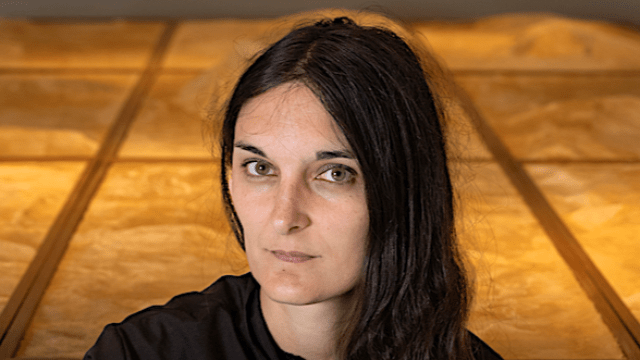Reflets Magazine #154 | Nathalie Joffre (E05): Art and Memory
In Reflets #154, Nathalie Joffre (E05) tells us about her double life. Indeed, she spends half her time among projectors, shooting for advertising campaigns, the other half deep in prehistoric caves creating archaeology-inspired artworks. Here’s a free extract of the article. If you’d like to read the next editions, sign up now!
Nathalie Joffre’s cultural involvement began at ESSEC. “I created an association, Les Dés’artsonnés, to organise lessons on campus in art and the history of art with teachers from the Ecole du Louvre and the Cergy School of Fine Arts.” At the same time, she enrolled at the Sorbonne to study archaeology and contemporary art. “And I did my first internship with Réunion des Musées Nationaux.”
Change of Scene
After graduating, however, Nathalie Joffre joined the American advertising agency JWT. “Ultimately, I found there was more room for creativity in this job, helping to produce the imagery and commercials for our advertising campaigns, than in an institutional organisation where I could only expect to get a management position.”
But she still felt the need to develop her skills further. “I took evening classes in photography and, as I improved, my documentary approach yielded to a more artistic technique.”
So much so that she decided to go back to university, this time for the second year of a master’s degree in Fine Arts Theory and Practice. “The curriculum required us to produce an artwork and write a dissertation on the questions it could raise on both an aesthetic and historical level.” That’s when the going got tough!”
And it became increasingly incompatible with her professional life. “At that point, I had joined Google’s Entertainment Space which supports the film, music and gaming industry through its digital strategy. I’d go to the Cannes Film Festival to meet the producers, I was tasked with missions like the launch of Assassins Creed II for Ubisoft. I found it interesting, of course, especially as it was the early days of the Internet, so we were trailblazers. But I missed the hands-on contact with matter. I spent my days working and my evenings and weekends studying.”
Land of Asylum
Following that period, Nathalie Joffre decided to take study leave and enrolled at the prestigious London College of Communication, a school of art in its own right.
“There, I rummaged through the archives of the Bethlem Royal Hospital, the oldest psychiatric institution in the West, and dug out the first ever photographic portraits of patients suffering, or thought to be suffering, from psychiatric or mental illness. Those medical documents raised questions about the representation of madness; amazingly, they used the bourgeois codes of their era, striking a contrast with the more recent, better-known photographs of the so-called hysterics of the Salpêtrière that convey a more stereotyped, tormented image.”
This led her to create an installation artwork entitled He Told Me That His Garden..., in which she films herself handling photo negatives, reading the corresponding registers and talking to those people, as if trying to make their portrayal complete. It explores the question of memory, a topic she had already approached in her first artworks - “photographs of my grandmother’s dressing gown in a nature scene, a video of myself performing in an old washhouse near the house where I grew up” - and which would become the central theme of her work.
From Shadow to Light
This experience not only allowed Nathalie Joffre to make a statement, it also earned her the Sproxton Award for Photography and an ICART prize. “These awards removed my mental block and brought new opportunities.”
Although this hasn’t led her to exit the business world, she now only works part-time, as a Partner and Artistic Director of v(room)), a branch of the Partizan production group specialising in content design for luxury brands. The rest of her time is spent carving out her path, bringing archaeology more and more into her research, especially since she obtained a residency at Centquatre under the European Nearch programme with Oxford University and INRAP. “I work in the field, be it at the Lascaux Cave, in Fontainebleau Forest or the Colombian Amazon, scrutinizing the archaeologists’ every gesture, not only the physical movements and their demands on the body, but also the metaphysical aspects, the way the gestures engage the imagination.” She then renders her observations in various ways: excavations mimed by actors, artefacts made from uncovered objects, drawings inspired by geological readings, a monumental mobile of funerary urns, etc.
As a result of her works, she has been exhibited at several museums and festivals in France and abroad, received regular invitations to talk at forums and seminars (including ESSEC’s iMagination Week) and has featured in articles in various magazines and academic publications. In other words, she has become a key figure on the cultural scene, confirmed by her selection for the Agnès Varda class of the French Ministry of Culture’s postgraduate course, alongside various personalities from the world of art and culture. “We spent a year meeting players on the ground and intellectuals to discuss the role of art and culture in a context of societal instability and crumbling values. And we put these discussions in the Ecotone podcast, to make our conclusions accessible to the widest possible audience.” A good way for her to leave her own mark for future generations.
Interview by Louis Armengaud Wurmser (E10), Content Manager at ESSEC Alumni
Translation of an excerpt of an article published in Reflets Magazine #154. Get the next issues (in French)

Comments0
Please log in to see or add a comment
Suggested Articles



